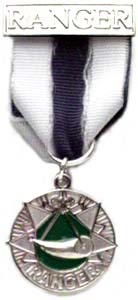These requirements became effective on June 1, 2014.
To see the requirements with the changes highlighted, Click here.
To see the previous requirements, Click here.
Note: You must complete the first aid core requirement before you begin this elective.
- Mountaineering
- Do the following:
- Explain the difference between bouldering and technical climbing.
- Tell how bouldering can help your crew get ready for more advanced climbing.
- Demonstrate bouldering using the three-point stance and proper clothing.
- Do the following:
- Explain the classification and grades of climbing difficulty in technical rock climbing.
- Tell how weather can change the difficulty of any ascent.
- Learn and then teach the following climbing knots to your crew,
another crew, a Scout group, or another group:
- Figure eight on a bight
- Water knot
- Bowline on a coil
- Figure eight follow-through
- Grapevine or fisherman's knot
- Do the following:
- Learn about the different types of ropes available for climbing and explain the uses of each and the characteristics of each.
- Learn proper climbing rope care. Know and practice proper coiling and storage.
- Know how to keep proper records on climbing rope and how to inspect it for wear and damage. Know when to retire a rope.
- Using the knowledge acquired above, make a tabletop display or a presentation for your crew, another crew, a Cub Scout or Boy Scout unit, or another group.
- Do the following:
- Demonstrate the difference between natural and artificial anchors.
- Be able to identify and describe the use of at least three different types of hardware and setups.
- Tell about proper climbing safety both before and during a climb.
- Learn about rescue equipment and techniques.
- Learn about appropriate clothing, footwear, gloves, helmets, and other climbing gear.
- Be able to correctly put on and then be able to teach others how
to put on at least two of the following:
- Commercially made climbing harness
- Diaper sling
- Knotted leg-loop seat
- Swiss seat sling
- Do the following:
- Demonstrate three types of belays.
- Learn and then demonstrate that you know proper verbal climbing and belaying signals used between climber and belayer.
- Do h(i), h(ii), or h(iii)
- Under the supervision of a qualified rappelling or climbing instructor, rappel at least 30 feet down a natural or artificial obstacle.
- Under the supervision of a qualified climbing instructor, climb at least 30 feet up a natural or artificial obstacle.
- Attend a two-day rock climbing clinic/course led by a qualified climbing instructor. This course should include some instruction on technical rock climbing.
- Lead your crew, another crew, an older Boy Scout troop, or another teenage group on a climbing and/or rappelling activity. Recruit adequate, qualified adult instructors and assist in instruction.
Checklist for use in working on these requirements: Format Word Format PDF Format
Source: Venturing Awards and Requirements (34784 - SKU 618767) and
www.scouting.org/filestore/venturing/pdf/Ranger_Award_Requirements.pdf. - Do the following:








